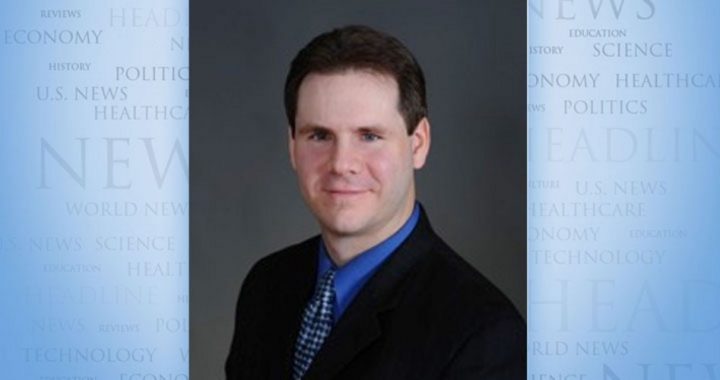
“The stench of fascism is in the air.” So said left-wing then-governor of California Pat Brown, in 1964, while opining on Republican Barry Goldwater’s presidential candidacy. According to commentator Christopher Tremoglie, this was the first time Democrats used the “fascist” pejorative against the GOP. It would not be the last.
On a personal note, there’s an irony here for me. My father was a Republican by 1964 and a staunch Goldwater supporter.
He also fought in WWII, was captured in battle, and spent time as a prisoner of war under the Nazi regime. So he might have known a bit more about fascism than Pat Brown (or, at least, would’ve been more honest about it).
Commenting on how the fascist label has become a reflexive Democrat propaganda tool, Tremoglie wrote at the Washington Examiner Monday that last “week, Robert Reich, former secretary of labor during the Clinton administration, tweeted, ‘Just wondering if ‘DeSantis’ is now officially a synonym for ‘fascist.’ Later in the week, President Joe Biden, once touted as the great unifier, referred to former President Donald Trump and his supporters as ‘semi-fascist.’ These words are just the latest in a long line of Democrats falsely accusing Republicans of being fascists, a disgusting practice.” This is all, mind you, despite Democrats’ “history of promoting slavery and segregation,” notes Tremoglie.
After applying the fascist label to Goldwater, the journalist relates, Democrats then tarred the rather liberal Richard Nixon with it. His successor, the GOP’s Gerald Ford, was likewise besmirched, as was Ronald Reagan and George W. Bush, Tremoglie also states. (Now that Reagan is dead, however, Democrats claim that today’s Republicans would be fine if only they were reasonable like Reagan!)
It has become so ridiculous, in fact, that even the Online Etymology Dictionary, a source not generally known for humor, writes the following under the entry “fascism”: “1922, originally used in English 1920 in its Italian form (see fascist). Applied to similar groups in Germany from 1923; applied to everyone since the rise of the Internet.”
Tremoglie concludes his piece by writing that no “one should take it seriously any time a Democrat calls a Republican a fascist, Joe Biden included…. There’s no legitimacy to these claims and certainly no realistic fascist threat — and anyone who says otherwise is not a serious person.”
Yet is it really true that there’s “no realistic fascist threat”? Assessing this requires first knowing what fascism is.
The ideology was born in Italy prior to WWII. As the Etymology Dictionary also informs, under the heading “fascist”:
1921, from It. partito nazionale fascista, the anti-communist political movement organized [in] 1919 under Benito Mussolini (1883-1945); from It. fascio “group, association….” Fasci “groups of men organized for political purposes” had been a feature of Sicily since c.1895….
Delving deeper, the term “fascism” also apparently derives from the fasces (Latin), a bundle of rods with a axe blade protruding that would be carried before a Roman magistrate and which symbolized power. Mussolini used the fasces as a symbol of his regime.
There’s something else about Mussolini, too: He was a fascism founding father, possibly the primary one. As such, it’s perhaps instructive that he defined the ideology thus: “All within the state, nothing outside the state, nothing against the state.” Now, question:
Whose ideology today most reflects this?
Some insight can perhaps be gleaned from an interview years ago on The Chip Wood Show with left-wing activist Tom Hayden. After a caller labeled Hayden a “communist agitator,” host Wood leapt to his guest’s defense, pointing out that Hayden did not at all favor the “communist” prescription: government ownership of means of production. Rather, Wood averred, Hayden simply wanted the state to ensure fairness.
Hayden quickly agreed, and then proceeded “to give several examples of how government must make sure that jobs and education and healthcare, among many other things, are distributed fairly to every citizen,” related Wood in 2010. As for the denouement, the rest of the interview went as follows:
“What you’ve described isn’t communism or socialism,” I [Wood] continued. “Isn’t the system you want — where ownership remains in private hands, but its use is controlled by government — actually a form of fascism?”
There was a stunned silence as I continued, “In fact, Tom, isn’t it fair to say that the economic system you want to impose on us in the United States is actually classical fascism, as practiced in Hitler’s Germany and Mussolini’s Italy?”
With that there was a click on the other end of the line. Tom had ended the discussion by hanging up the phone.
It was a click that spoke volumes. Wood’s analysis apparently struck too close to home.
So who, again, are the fascists? Love Trump or hate him, as someone who showed a measure of deference to states’ powers and eliminated federal regulation, he cannot be a fascist. Fascists don’t shrink government or its role or reach; they expand such things.
In contrast, Pat Brown, Biden, and virtually all other modern-day Democrats share Hayden’s big government ambitions. The same is true of Robert Reich, even if he isn’t the Fourth Reich. They very much believe, “All within the state, nothing outside the state, nothing against the state.”
Of course, the most fundamental way of defining matters isn’t with “isms” but in terms of good and evil. But if we’re going to “ism” away, we should at least know what we say.
Correction: This article originally referenced Jerry Brown as governor of California in 1964. The governor in question was Pat Brown, Jerry’s father. We apologize for the error.



